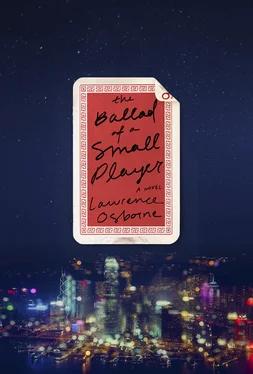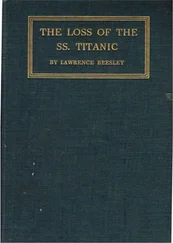“Grandma?”
“We call her Grandma. She’s the wife of a property developer. He’s Hong Kong money. He plays around with the women. She’s allowed to gamble away his money. We call it marriage. It’s a nice arrangement for us.”
He was unpretentious about it. Now there was complicity between us: the bank that always wins and the punter who has gotten lucky for a single night, both allied against the terror of Grandma.
“What’s her name?”
“We don’t speak her name. She’s just Grandma.”
He leaned down then.
“I wouldn’t play with her, sir. She’s an opportunist.”
“Aren’t we all?”
“Yes, sir. But she’s bad news.”
At that moment Grandma looked up from her hand and caught sight of me at the very moment that I was scrutinizing her myself.
“She doesn’t look so bad,” I said.
“She’s a terror, sir.”
She recognized me at once and there was a cruel avidity in her eyes as she cashed in her game, got up, and waddled over to our table. The punters seemed to know her and made way for her. As she came into the table’s harsher light her thickly painted and cratered face looked like an overripe peach, furred and uneven, and the eyes were worlds of private pain. She pushed her way to the far end of the table and a place was found for her. She laid a vulgar sequined bag on the table’s edge and took out a pair of reading glasses, which she placed on the end of her nose. Her lips looked as if they had been dipped in hibiscus juice. There are certain faces that appear to be caving in from the inside in slow motion, like cliffs dynamited by experts. Faces that remind you that life is not what you think it is, and that no one escapes scot-free.
But in this instance I also recognized the face, as one will recall an image from a long-ago dream that has remained in the mind for a reason. And the recognition was mutual.
“You,” she said to me. “I remember you. You are a bad gambler, as well as being a gwai lo . I have been hearing stories about you. I heard you won a natural downstairs.”
The table was all ears.
“Oh yeah,” she went on. “This guy scored two nines downstairs earlier this evening. I have it from reliable sources.”
The bankers looked at me sternly; the crowd muttered.
“Jinxed,” I heard a voice say.
“It’s true,” I said. “I’m having a run.”
Grandma huffed.
“You call it a run.”
My voice rose.
“I’m on a run. I have means.”
She smiled.
“Do you want to ask the boss if it’s okay to go on?”
“I don’t have to ask him.”
“You have to ask him.”
“I have the money. I have the chips. It’s all in three dimensions.”
Baccarat is virtually impossible to cheat at. Grandma opened her horror bag and took out a huge roll of cash. The crowd stirred.
“I’m not afraid of this foreigner,” she spat at me. “If I lose it I don’t care.”
“Would madam like a glass of champagne?” I asked.
She lightened up and we exchanged a smile. I am a famous charmer. Grandma didn’t go for niceties, even though she liked a bit of male attention.
“Make it cold, boys. I’m going to play this genius.”
I looked over at the clock: 12:04. I was now more conscious of the time, the exact times that games were being played. As if time itself now were more carefully partitioned and hoarded. It was even possible that I was becoming superstitious about it.
The champagne came. Pol Roger bucketed in mounds of crudely cut ice. Not the best, not the worst.
“That’s the way I like it,” Grandma cried.
“Xie xie,” she said after a sip.
Soon the cards were dealt to seven players surrounded by a large group of onlookers. They began to mutter the words that Macau baccarat players always mutter when they are given their cards, tsui tsui tsui , or blow blow blow. This is to blow away one point on a card, as when a player draws a jack and knows that if the second is a nine he will win and if it is a ten he will lose. Peeping at the second card from the side, he cannot tell a nine from a ten and so will blow on it as it turns. There is in fact a whole slang connected to peeping at the cards before they are turned and counting the number of points visible along their edge. The ten card, for example, has four points along its edge and the Chinese call it say bin , after the word for edge, bin. An eight card has three points on its edge, and is called sam bin .
I let the others turn their hands first and waited until Grandma had pulled a seven. She looked pleased with herself, as well she might have. It was going to be the winning hand and she knew it. I turned mine: a three and a two. At first, no one said anything. I looked again at the clock. It was 12:25. For a moment the crowd stirred slightly and resettled like a patch of grass stirred by a breeze. Their faces betrayed a premonition that had no real shape, and I thought that some reassurance was called for, some verification from a higher source that all this was not going to end in tears, but what would it be? “That makes five,” Grandma said as she collected the chips. She actually laughed at it, just as the other players abruptly rose and left the table.
“My husband would love this,” she went on. “He would bet against the Englishman on the next hand. He’d say no one can lose against an Englishman.”
“Shall we?” I said icily.
“I’m not afraid of you, and I’ve already said it. You may have money, but not as much as my husband.”
“I’d like to know who he is.”
“It’s none of your business who he is. He could buy all these casinos out if he wanted, and they know it.”
“Why isn’t he here?”
“Play?” the banker tried.
“Shut up, we’re talking. It’s not every day I talk to an American.”
“English,” I corrected.
“Same thing. You’re not Chinese or French. Or Portuguese. Waiter, bring me a spit bowl.”
The banker leaned forward.
“There’s a sixty-dollar spit fine, Grandma.”
“I need to spit, to hell with the fine.”
She spat into a silver bowl.
“Feels good,” she sighed. “I love spitting.”
She offered the bowl to me.
“Nothing like a good spit.”
“No, thanks.”
“Shall we play again?”
I was calculating wildly to myself.
“Of course,” I said irritably.
“Have you still got your balls?”
“Sewed them back on myself,” I said.
“Good. That makes you the exception.”
The bankers looked at me gently. I had made a mistake and they had seen it coming from a mile off.
“I like a man who can operate on himself,” Grandma said.
I had eight thousand on me and a hundred thousand in the room, but I had to pay the hotel bill imminently and it was more than those two sums combined. I would have to bargain with the Lisboa management as it was, and who knew what they would say. Grandma was right. I ought to withdraw with a bit of winnings and pay off my tab with the Lisboa. I ought to cut my losses. But I couldn’t. I was a swine in that moment and I loved the swinishness, the feeding anxiety next to the trough. I stood my ground and fingered the last notes in my pocket, which I now extracted, handing them to a staff member. All eight thousand. I wished I hadn’t left the hundred thousand in my room; I would have burned through that in exactly the same moment. The man took them almost apologetically. He knew the smell of desperation and fever. A fever in the Congo, like that of a white man decomposing in his hammock hour by hour.
When the chips came I laid them all down in four installments. Grandma laid down large bets of her own, and our game was as slow as a very fast game can be. Her crest of bird feathers quivered just below the line of floating smoke, and she occasionally turned around and abused the champagne. My two cards were turned and there were a two and seven, against her baccarat. The onlookers touched their mouths as if they were watching a botched execution and they grew much quieter than they had been. The banker bowed to us both and pushed the chips over to me. Grandma, seemingly stunned, looked at her watch and then shrugged, as if to herself, her plump shoulders rolling for a moment, then subsiding. She must have once been a woman of considerable beauty. For a moment the gwai lo scum was a winner, and winners are always interesting. This lasted for about three minutes. The very next hand I lost and saw half my eight thousand vanish to the bank. Grandma laughed so loud the boys flinched.
Читать дальше












